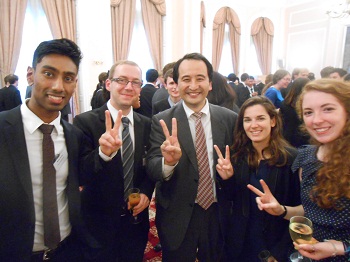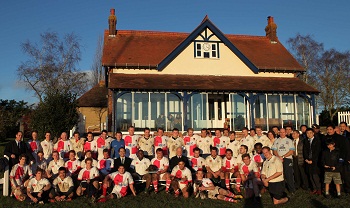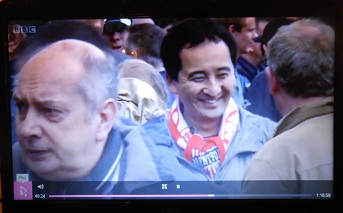We recently interviewed Mr Kazuya Mori, Counsellor and Deputy Director of the Japan Information and Cultural Centre at the Embassy of Japan, prior to his return to Tokyo in mid-August to take up a new position there. A summary of the interview follows:
|
Thank you for taking the time to answer a few questions today. I’d like to begin by asking which part of Japan you are from and how you spent your early years.
I was born and raised in Osaka, in the Kansai area in western Japan. It is regarded as a unique area of Japan, somewhat independent in culture. For example, we tend to be more direct than people from other regions. Even if we’re in Tokyo, we start to speak in the Osaka dialect. Also, we have our own distinctive sense of humour, characterised by what we call boke and tsukkomi. In comedians’ routines, the person in the boke role is the overtly funny guy who generally makes a fool of himself, while his tsukkomi counterpart is more of the straight man, though he too makes a fool of himself! When people from Osaka get together, boke-tsukomi banter often ensues. In fact, the well-known Japanese comedy genre known as manzai is originally from Osaka.
And we also have very distinctive food types, and especially like to eat things which are made of flour, such as okonomiaki and takoyaki, the recipes for which by the way I introduced in my previous contribution to the webmagazine.
So Osaka – and also the Kansai as a whole – is very different from the rest of Japan. And that’s where I was born, so you can easily imagine what kind of person I grew up to be.
|
|
But after being raised in what was a very rural part of this big city of Osaka, when I was about 10 my family had to move from Japan to the United States because of my father’s work. It was a significantly different experience to be put in a totally different world beyond the horizon, so of course I was shell-shocked. But at the same time, maybe because I was young, I didn’t feel very much pressure and actually I was glad to see what was beyond the borders, to see that the world is indeed big and diverse. It was really a turning-point and transformed my mindset. I eventually spent about five years in the United States before I came back to Japan, where I re-entered the educational system and went on to study at the University of Kyoto.
|
You mentioned your experience in the US as a pretty positive one. What else stands out from your childhood? Is there any particularly good memory – or even a bad one?
One thing I remember is that, when you travel like that and go to a different country, the family bonds are strengthened because you have more time to spend with your parents and your sisters and brothers. So I very happily remember all the time spent with my family, especially travelling from where we used to live in Los Angeles to the various great landscapes that the United States has to offer, like the Grand Canyon, the Grand Circle, Las Vegas and all those places. It was a fun time for our family.
|
What made you decide to join the Foreign Ministry?
As I said just now, as a child growing up I was shocked – in a very good manner, in a positive way – to find a big wide world out there, and so I naturally took interest in trying to learn more about what’s there and how Japan can get along with other countries and peoples. Also, I saw my father working abroad and he seemed to be having fun working with people from different origins for the common cause, so as a child I developed a fond memory of these things, which naturally led me to conclude that I should choose a job which allowed me to travel as much as possible. So the logical choice was to join the Foreign Service, because they would probably offer me the best chance of working abroad.
|
OK. Could you give us an idea of the main phases of your career?
Sure. After I enrolled in the foreign service, my task was mainly centred around the United States, and my experience of living there did help me in my job. I was also sent to the United States for four years, the first two studying at graduate school and the latter half of the four years working for the Embassy in Washington DC. And then I was brought back to Japan, and spent ten long years working tirelessly! After that, it seems that I was always given tasks that were beyond what I could have imagined or predicted.
For example, my first task back in Tokyo concerned Africa, not America, where I had previously been. After two years working on Africa, I still found this job exciting because it was new to me. So after two years I wanted to continue being involved with Africa, but then I was assigned to work on the United Nations! Again I found it fascinating, working for instance on UN Security Council reform and talking with people from other major countries on how we could proceed with the reorganisation of this important UN function. After that I was brought into working on assisting developing countries, and then I worked on free trade agreements, most notably the Trans-Pacific Partnership, up until 2010. And that was when I was told that I’d had enough fun in Tokyo and it was time to start working abroad again!
Thus, in the summer of 2010 I was sent to Moscow even though I had never worked on anything to do with Russia. Again, I enjoyed my new task, this time as the Political Officer in Moscow. Then, two years ago in 2012, I arrived in London, and again I took on a task that I had never tried before in my career, which was working on cultural and information affairs. In this regard, I can’t help feeling it’s a pity that I was not able to come to London in time for the 2012 Olympics.
If I can just summarise this long story about my career so far, as one famous American movie says, “Life is like a box of chocolates”, and life as a foreign service officer is similar in a way, because you never know what you’ll be working on next. My experience tells me that so far it has always been a surprise in a positive way. Also, as a bonus I should say, I’ve been able to travel to more than 60 countries on business and leisure, so it has been a great experience for me.
|
Now that you’re about to leave after a very busy stint here, what do you think will be some of the strongest memories you take with you?
One is that, in order to promote Japan’s presence here and also to try to improve the image of Japan, and also to convey what Japan is really like to people here in the UK, it was exciting to join the very lively discussions both internally and with other relevant organisations to explore in what specific ways we could achieve these goals. For example, we talked about how we could make this website even better, and also discussed how we could maybe use football stars, celebrities or some splendid art events and musical events, how we could use those occasions to make Japan more visible in this city. It was really exciting to find out about these possibilities.
Secondly, I was extremely honoured to be involved in the visits by important figures from Japan. Most notably, I was part of the press team working on the visits by Prime Minister Abe to the UK. I was really glad to see that his speeches on the Japanese economy delivered at London’s Guildhall were very well received by the people here, and also by the British media.
Thirdly, I mentioned London 2012 a moment ago. As for the Tokyo 2020 Games, I was delighted to help Tokyo’s launch of its international campaign here in London, and then, after the success of Tokyo’s bid, to play a part in the dialogue between our two governments on possible cooperation between London 2012 and Tokyo 2020, which eventually led to the signing of a Memorandum of Understanding to promote collaboration in the run-up to the 2020 Games. Actually, this document also deals with another sport on which I worked closely: rugby. Japan will host the 2019 Rugby World Cup after England stages the tournament in 2015. I hope to see our two countries’ ever-so-strong tries reinforced through sport. If possible, I would love to come back to be a part of such interaction in the future.
|
 With JETs (Japan Exchange & Teaching Programme) personally
With JETs (Japan Exchange & Teaching Programme) personally
interviewed (unofficially dubbed as “Mori’s Children”)
|
 At Oku Memorial Rugby Tournament held at Oxford in honour of the
At Oku Memorial Rugby Tournament held at Oxford in honour of the
late Ambassador Katsuhiko Oku (former head of JICC) |
Finally, and it’s more of a personal thing, I was able to form what I am secretly calling “Mori’s children”. I’ve been part of the Japan Exchange & Teaching (JET) Programme interview for the last two years and have also had the honour of making a few remarks to the group of JETs who are about to travel to Japan. I was delighted that, at the departure reception for them that we had recently, many of the young people I had interviewed remembered me and gathered around me, asking for advice, or simply saying “Hi!” to me. It was nice to get to know these promising young British people and to feel that I was able to help send them to my country. |
So those are your professional memories. Now, what do you like to do in your spare time? |
Although I am not a great athlete myself, I am a very keen sports spectator. I am happy to watch any kind of sport, but nowadays football is my main preoccupation. In two very short years I have visited many stadiums around this country to watch matches. In total, I have been to more than 30 football matches over this period, not only in the Premier League but, thanks to help from my friends at JICC, I have also visited stadiums in the lower divisions frequently.
At the same time, I have realised both that football is an ice-breaker in conversation here in this country and that it is sometimes also risky to name your favourite team! Those are the things I have learned.
|
 Making a cameo appearance on the Football League Show
Making a cameo appearance on the Football League Show |
Now, a question with a somewhat different focus. If one of your British acquaintances were going to visit Japan, including your own region, for the first time, and you were able to be his or her guide for a day or two, what would you enjoy showing that person?
First of all, wherever I took my friend with me in Japan, I would want him or her to learn that, as opposed to the traditional image, it is not that expensive to travel in Japan. Actually, sometimes it’s much cheaper to eat or go out in Tokyo than in London. Furthermore, I would want my friend to appreciate the fact that Japan is a mix of different types of scenery, images and cultures. Just take Tokyo or Osaka, where you can experience very high-tech skyscrapers standing next to old temples and shrines, and this mixture of various images is unique, so I hope that my friend would enjoy that. Also, but more significantly, when my friend came to the Kansai area, where I grew up, of course I would recommend historic Kyoto, and I would strongly suggest a visit to Osaka to enjoy our food delicacies. In addition, I would recommend stopping by at Koshien Stadium, which is the Japanese Mecca or sacred place for the sport of baseball, to enjoy the crowd and atmosphere when the Hanshin Tigers play there. It’s probably like Old Trafford or Anfield, so I hope it would make a similar impact.
OK. Well, there is just one more question that we like to ask most people. If you hadn’t joined the Foreign Ministry, what might you have done instead?
Most likely because I was brought up in the Osaka area, I actually don’t mind speaking, socialising or mingling with other people, so I suppose if I had not been a diplomat I may have taken a job in the media, or actually, since I like singing very much, I may have pursued that profession. However, in my college days, as an “internet illiterate”, when I decided to apply to Japanese TV and newspaper companies, I realised that the application deadline had already passed! And secondly, I really love music, so my parents made me try the piano, organ, flute and trombone. Unfortunately, I was unable to stick with any of them as I was not good enough, but happily I did enjoy, and I still enjoy, singing quite a lot. In fact, I enjoy going to karaoke here in London as well. Coincidentally, in my current job here in London I get to meet people who have actually taken up these things as professionals. I encounter a lot of people from the British media as well as many young Japanese talents giving performances here at the Embassy and in other places. At such times it comes home to me that, although I am very interested in these fields, I would have needed to do a great deal in order just to reach where these people are now.
So, in a sense, your capacity as a diplomat has enabled you to get a feel for these professions without plunging in directly?
Yes, in a sense maybe I have been able to get a ‘mock experience’ of what it is like. But, as I said, they work tremendously hard, so it would probably have been very difficult for me to reach their level.
Well, I’m sure our readers will be glad you chose to be a diplomat. Thank you very much!
|
|

